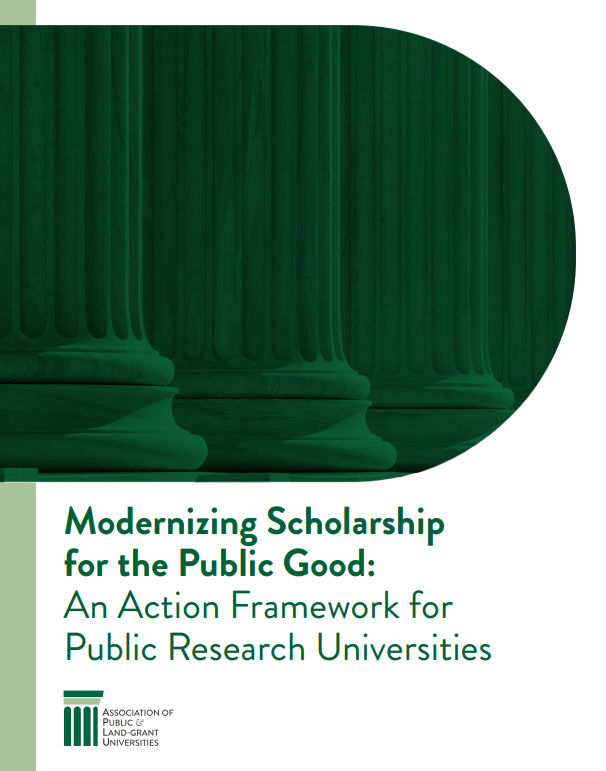Modernizing Scholarship for the Public Good

Public research universities have over 150 years of history of spearheading scholarship that advances the public interest. Founded to serve the public through their education, research, and engagement work, they provide life-changing education to students, advance society-shaping innovations, and engage communities to tackle our most stubborn challenges. Read the executive summary below and the full report, Modernizing Scholarship for the Public Good: An Action Framework for Public Research Universities.
Why It Matters
The problems facing communities, regions, countries, and the globe are increasingly multifaceted and complex – challenging public research universities to expand and renew how they deliver on their missions for a new era.
The Big Picture
Seeking to spur more publicly engaged and impactful research, APLU launched the Modernizing Scholarship for the Public Good initiative. Drawing on the expertise and insights from stakeholders and public research university leaders from across the university, years of research, and a deep base of academic literature, APLU has outlined eight areas for strategic action that universities can take to support publicly-engaged (PE) and publicly impactful research (PIR) to benefit society.
What’s New
This Action Framework provides evidence-based approaches for leaders to engage constituencies across campus to incentivize, recognize, and promote publicly engaged scholarship. Each strategic action is categorized by role and responsibility or university unit to provide individuals and units concrete steps they can take to advance publicly engaged and publicly impactful research at their institution.
Because modernizing scholarship requires many approaches to institutional change, the framework also highlights institutional examples, including strategies and processes, from universities that have successfully taken such action.
The Action Framework outlines eight major overarching areas for strategic action by institutions to advance modern public research and scholarship:
- Develop committed institutional leaders. Driving institutional change requires strong leadership. Creating professional development opportunities for the next generation of university leaders – especially leaders with backgrounds and identities that are underrepresented in the academy – requires developing supports, programming, and opportunities for future leaders and emerging scholars.
- Reform appointment, retention, tenure, and promotion practices. Faculty appointment and retention policies and practices represent a pivotal opportunity for universities to signal that they value scholarship and scholars who pursue publicly engaged or equity-oriented work. This area for strategic action focuses on the ways that faculty – including tenure-track, extension, fixed-term or contractual, research, curatorial, clinical, and other groups – are recruited, evaluated, promoted, and retained.
- Invest in institutional structures and networks. Support structures and networks are key elements of infrastructure that enable scholars to connect with one another and with the communities that their universities serve. Creating or expanding new infrastructure for publicly engaged research – including physical, social, and digital infrastructures – signals institutional priorities and creates new mechanisms to support publicly engaged scholarship.
- Establish stronger reporting structures at the institutional level. Tracking and reporting on outcomes and impacts are powerful mechanisms that enable institutions to set strategic goals, evaluate progress, and incentivize change as necessary. Most successful data and outcome tracking and reporting efforts exist in a unit structure that has a clear strategic charge and dedicated capacity for evaluation and assessment, usually in central university administration.
- Build capacity for engagement and equity work among faculty. Creating workshops, mentoring or training programs, speaker series, fellowships, and other mechanisms for professional development is an important strategy to signal institutional priorities and ensure scholars have the knowledge, skills, and mindsets needed to succeed.
- Launch and maintain catalytic funding programs. Providing catalytic funding opportunities can directly encourage more scholarly activity focused on a prioritized approach and/or content area for publicly engaged research. Efforts in this area are most effective when internal grant mechanisms have clear, defined priorities supporting under-valued scholarship, provide both financial and non-monetary resources, and are sustainably supported.
- Develop awards and programs to recognize and celebrate work. Creating and amplifying mechanisms for recognition and awards is a powerful tool to raise the visibility of institutional priorities and highlight exemplary work. This area of strategic action can take many shapes, including creating awards and prizes, fellowship programs, media highlights, publication outlets, and other approaches to celebration and awareness.
- Formalize curricular training and professional development opportunities for students. Early career scholars are eager for their work to have impact. Focusing on student training takes a long view towards strategic action, especially if it equips students with different skill sets and mindsets about scholarship and empowers them to act as leaders.
From addressing local economic hardship to promoting public health to mitigating climate change, the vexing challenges facing communities, regions, countries, and the world are increasingly complex. Public research universities are uniquely positioned to engage with communities to tackle these challenges through path-breaking research.
This material is based upon work supported by the Association of Public and Land-grant Universities (APLU) and the Office of Food, Agriculture, and Natural Resources (FANR), the University of Michigan’s Office of the Vice President for Communications, the Rita Allen Foundation, the Kavli Foundation, and the Burroughs Wellcome Fund (#1022914) as part of the Civic Science Fellows program, and the National Science Foundation (#1834518). Any opinions, findings, conclusions, or recommendations expressed in this material are those of the authors and do not necessarily reflect the views of the supporting organizations.



Stay Connected
X (formerly Twitter)
Facebook
YouTube
LinkedIn
RSS